
William Edward Burghardt Du Bois was an American sociologist, socialist, historian, and Pan-Africanist civil rights activist.
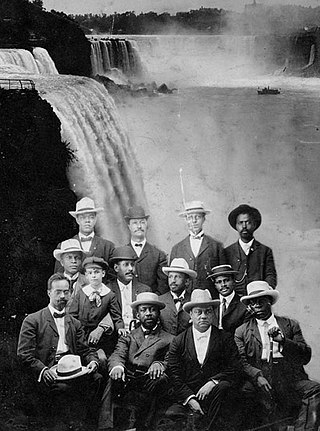
The Niagara Movement (NM) was a civil rights organization founded in 1905 by a group of activists—many of whom were among the vanguard of African-American lawyers in the United States—led by W. E. B. Du Bois and William Monroe Trotter. The Niagara Movement was organized to oppose racial segregation and disenfranchisement. Its members felt "unmanly" the policy of accommodation and conciliation, without voting rights, promoted by Booker T. Washington. It was named for the "mighty current" of change the group wanted to effect and took Niagara Falls as its symbol. The group did not meet in Niagara Falls, New York, but planned its first conference for nearby Buffalo. The Niagara Movement was the immediate predecessor of the NAACP.

Carter Godwin Woodson was an American historian, author, journalist, and the founder of the Association for the Study of African American Life and History (ASALH). He was one of the first scholars to study the history of the African diaspora, including African-American history. A founder of The Journal of Negro History in 1916, Woodson has been called the "father of black history." In February 1926, he launched the celebration of "Negro History Week," the precursor of Black History Month. Woodson was an important figure to the movement of Afrocentrism, due to his perspective of placing people of African descent at the center of the study of history and the human experience.

Joel Elias Spingarn was an American educator, literary critic, civil rights activist, military intelligence officer, and horticulturalist.
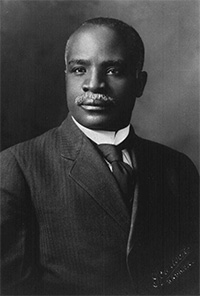
Kelly Miller was an American mathematician, sociologist, essayist, newspaper columnist, author, and an important figure in the intellectual life of black America for close to half a century. He was known as "the Bard of the Potomac".
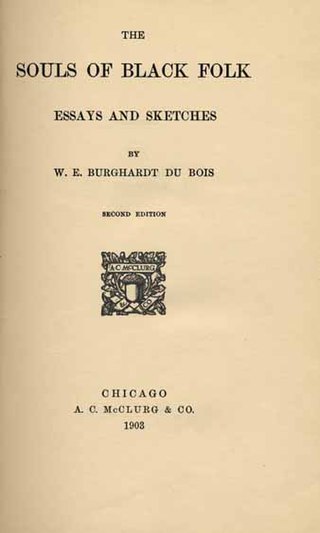
The Souls of Black Folk: Essays and Sketches is a 1903 work of American literature by W. E. B. Du Bois. It is a seminal work in the history of sociology and a cornerstone of African-American literature.

Frank Johnson Goodnow was an American educator and legal scholar. He was the first president of the American Political Science Association. He was an elected member of both the American Academy of Arts and Sciences and the American Philosophical Society.
The talented tenth is a term that designated a leadership class of African Americans in the early 20th century. Although the term was created by white Northern philanthropists, it is primarily associated with W. E. B. Du Bois, who used it as the title of an influential essay, published in 1903. It appeared in The Negro Problem, a collection of essays written by leading African Americans and assembled by Booker T. Washington.
William Archibald Dunning was an American historian and political scientist at Columbia University noted for his work on the Reconstruction era of the United States. He founded the informal Dunning School of interpreting the Reconstruction era through his own writings and the Ph.D. dissertations of his numerous students. Dunning has been criticized for advocating white supremacist interpretations, his "blatant use of the discipline of history for reactionary ends" and for offering "scholarly legitimacy to the disenfranchisement of southern blacks and to the Jim Crow system."
Walter Lynwood Fleming (1874–1932) was an American historian of the South and Reconstruction. He was a leader of the Dunning School of scholars in the early 20th century, who addressed Reconstruction era history using historiographical technique. He was a professor at Vanderbilt University from 1917 through his career, also serving as Dean of the School of Arts and Sciences, and Director of the Graduate School. A prolific writer, he published ten books and 166 articles and reviews. The son of a plantation owner who had slaves, Fleming was sympathetic to White supremacist arguments and Democratic Party positions of his era while critical of Republicans and Reconstruction.

This is a selected bibliography of the main scholarly books and articles of Reconstruction, the period after the American Civil War, 1863–1877.
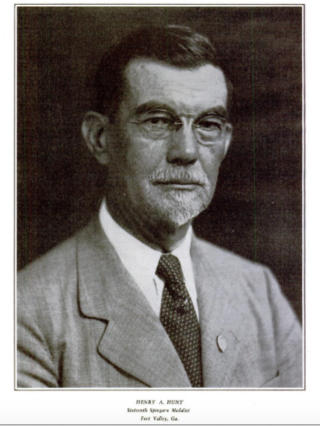
Henry Alexander Hunt was an American educator who led efforts to reach blacks in rural areas of Georgia. He was awarded the Spingarn Medal by the National Association for the Advancement of Colored People (NAACP), as well as the Harmon Prize. In addition, he was recruited in the 1930s by President Franklin D. Roosevelt to join the president's Black Cabinet, an informal group of more than 40 prominent African Americans appointed to positions in the executive agencies.
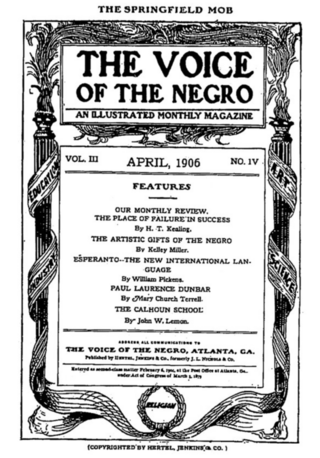
The Voice of the Negro was a literary periodical aimed at a national audience of African Americans which was published from 1904 to 1907. It was created in Atlanta, Georgia in June 1904 by Austin N. Jenkins, the white manager of the publishing company J. L. Nichols and Company. He gave full control of the magazine to the Black editors John W. E. Bowen, Sr. and Jesse Max Barber.

May Howard Jackson was an African American sculptor and artist. Active in the New Negro Movement and prominent in Washington, D.C.'s African American intellectual circle in the period 1910-30, she was known as "one of the first black sculptors to...deliberately use America's racial problems" as the theme of her art. Her dignified portrayals of "mulatto" individuals as well as her own struggles with her multiracial identity continue to call for the interpretation and assessment of her work.

Lafayette M. Hershaw was a journalist, lawyer, and a clerk and law examiner for the United States General Land Office of the United States Department of the Interior. He was a key intellectual figure among African Americans in Atlanta in the 1880s and in Washington, D.C., from 1890 until his death. He was a leader of the intellectual social groups in the capital such as Bethel Literary and Historical Society and the Pen and Pencil Club. He was a strong supporter of W. E. B. Du Bois and was one of the thirteen organizers of the Niagara Movement, the forerunner to the NAACP. He was an officer of the D.C. Branch of the NAACP from its inception until 1928. He was also a founder of the Robert H. Terrell Law School and served as the school's president.

Buell Gordon Gallagher served as president of Talladega College from 1933 to 1943 and as the seventh president of the City College of New York between 1953 and 1969. He was an ordained Congregational Minister and a pioneer in race relations.
The Atlanta Sociological Laboratory was founded in 1895-96 at Clark Atlanta University in Atlanta, Georgia.
Raymond Reilly Wolters was an American historian. He was the Thomas Muncy Keith Professor Emeritus of History at the University of Delaware, where he taught from 1965 until his retirement in 2014. He authored seven books. In 1985, his book The Burden of Brown: Thirty Years of School Desegregation won the American Bar Association's Silver Gavel award, a decision that proved controversial because the book was accused of being racist.
Elliott M. Rudwick was a professor of Sociology and History as well as an author in the United States. He wrote about African Americans and their history including W. E. B. Du Bois. He corresponded with Du Bois. Rudwick worked with historian August Meier on several books. He also wrote about the East St. Louis massacre of 1917.
Herman H. Dreer (1888–1981) was an American academic administrator, educator, educational reformer, activist, author, editor, Baptist minister, and civil rights leader. He is best known for writing curriculum and programming for teaching African American History at most grade levels for early 20th-century public schools. Dreer is also credited with initiating Black History Month observance in the United States, alongside Carter G. Woodson.












